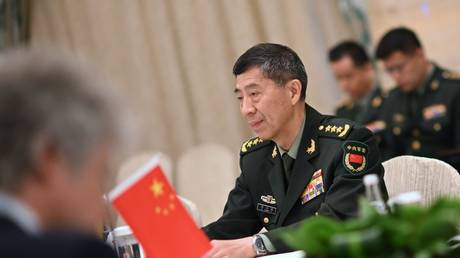
A Chinese warship came within 150 yards of colliding with a US destroyer as tensions flare around Taiwan
China’s foreign minister has defended the actions of its navy after it sailed a warship into the path of American and Canadian vessels conducting joint exercises in the Taiwan Strait on Saturday, saying the so-called ‘freedom of navigation’ patrols are an act of aggression towards Beijing.
In an address to a host of global defense officials at the Shangri-La Dialogue in Singapore on Sunday, General Li Shangfu said Beijing was unconcerned by what he called “innocent passage” but that it must “prevent attempts that try to use the freedom of navigation [patrols], that innocent passage, to exercise hegemony of navigation.”
Li’s comments follow an incident on Saturday in which a Chinese warship reportedly came within 150 yards (137 meters) of the US destroyer USS Chung-Hoon and a Canadian vessel with which it was conducting exercises. The Chinese ship sailed into the path of the US vessel and warned it that there would be a collision if it didn’t change course, according to Canada’s Global News, whose reporters witnessed the near-miss.
After receiving a warning from the US destroyer, the Chinese warship altered its course at the last moment to avoid a collision, reports indicate.
Speaking at the same conference in Singapore on Saturday, US Secretary of Defense Lloyd Austin said Washington would not “flinch in the face of bullying or coercion,” and that it would continue to maintain a presence in the Taiwan Strait and South China Sea – countering China’s territorial claims by underscoring that the areas which were the source of Saturday’s dispute are international waters.
Li, however, insisted that the US and its allies were responsible for an increase in tensions in the region and advised Washington to take “good care of your own territorial airspace and waters.” He added: “In China we always say, ‘Mind your own business.’”
In what was his first international address since becoming China’s defense minister in March, Li also emphasized Beijing’s position on Taiwan, calling it the “core of our core interests” and said it would never hesitate to “defend our legitimate rights and interests.”
Beijing has previously expressed frustration at what it sees as Washington meddling in its affairs, particularly as it pertains to Taiwan – disputed territory over which China claims sovereignty as part of its ‘One China’ policy.
The United States diplomatically recognizes China’s territorial rights to Taiwan but Beijing has objected to Washington providing Taipei with defense training and conducting diplomatic meetings with Taiwan’s leadership.




